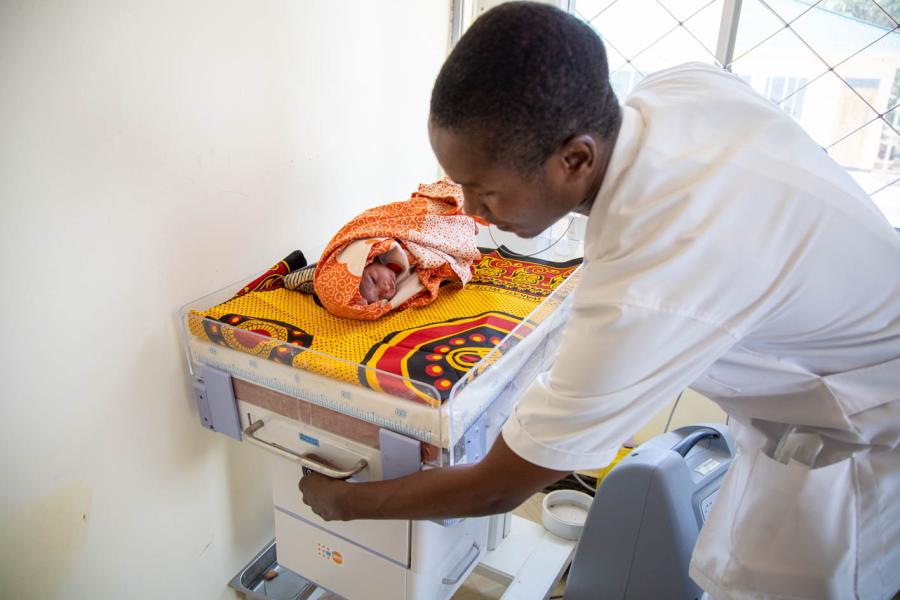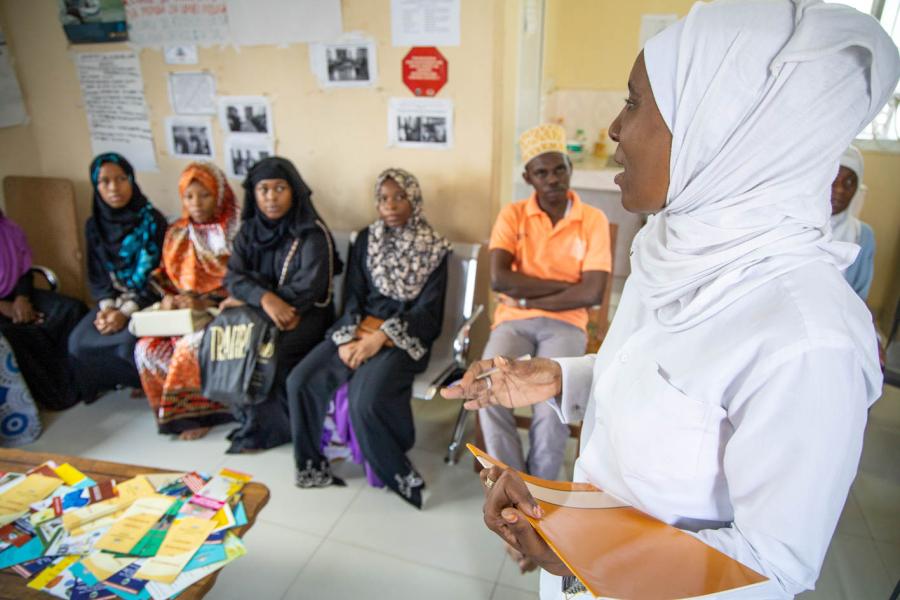Midwives save more than just lives

Midwives play a key role in the empowerment of women and building equitable, inclusive and sustainable societies.
Agnes Ndunguru is a midwife in Tanzania. She is also a holder of a Super Woman Award, presented to her by the then Vice President H.E. Samia Suluhu Hassan on International Women’s Day in 2019. She says she has witnessed many healthy and happy deliveries, but she also remembers the mothers and children who didn’t make it. She becomes visibly upset as she remembers a mother of three children who died during childbirth due to post-partum haemorrhaging. “As she took her last breath, she looked into my eyes and cried, ‘Midwife, my children, my children….’ That incident lives with me to this day.”
Agnes says that there are many challenges that make her job difficult – stockouts of life-saving, maternal health medicines, power outages and a lack of the equipment needed to assist mothers and newborns during and after delivery. But Agnes says she was born a midwife and is dedicated to her job.
Today – 5 May – we join hands with midwives in Tanzania and around the world to commemorate International Day of the Midwife. We celebrate nurse-midwives like Agnes, and the thousands of nurse-midwives like her in Tanzania, and thank them for their hard work, day in and day out, which is contributing to healthier families, more productive communities and to a more robust health system in Tanzania.
This years’ commemorations – with the global theme “Follow the data: Invest in Midwives” – coincide with the launch of the State of the World’s Midwifery Report 2021,[1] co-led by the International Confederation of Midwives, UNFPA and the World Health Organization (WHO), which brings the latest data on the return on investment in midwives. The evidence is clear: investment in midwives is a cost-effective approach to improving health outcomes for mothers and babies and reducing maternal and neonatal mortality and stillbirths. Data indicates that universal coverage of midwife-delivered interventions could avert 67 percent of maternal deaths, 64 percent of neonatal deaths and 65 percent of stillbirths, allowing 4·3 million lives around the globe to be saved annually by 2035.

But it is not just about saving lives; midwives are the key to achieving Tanzania’s Vision 2025 and the ambitious sustainable development goals (SDGs), as emphasized by Feddy Mwanga, President, Tanzania Midwives Association (TAMA):
“Midwives not only improve the chance of a safe pregnancy and delivery, but also provide the full continuum of care throughout women and adolescents’ lives. By doing so, they play a key role in the empowerment of women and building equitable, inclusive and sustainable societies.”
As part of the day’s commemorations a symposium, “Midwives save lives: Invest in midwives” will take place in Dar-es-Salaam, led by TAMA, in collaboration with the School of Nursing at Muhimbili University College of Health Sciences and the Ministry of Health, Community Development, Gender, Elderly and Children (MoHCDEC). UNFPA has provided technical support for the symposium, which is funded by WHO and Global Affairs Canada, who, under Canada’s Feminist International Assistance Policy, is supporting efforts in Tanzania to strengthen health systems and improve the sexual and reproductive health and rights of women and girls, including a reduction in the numbers of preventable maternal, infant and child deaths.
“Investment in midwives needs to include not just investment in their numbers, but investments in their education, ongoing training, regulation, and working environment,” said Pamela O’Donnell, High Commissioner of Canada in Tanzania. “If these investments are made they will be able to achieve their full life-saving, health-improving, system-strengthening potential.”

UNFPA is the lead UN agency supporting efforts under the leadership of the Government of the United Republic of Tanzania, and in partnership with TAMA, to build a competent, well-trained and well-supported midwifery workforce. In addition to our technical support to improve midwifery education, training and regulations, we have also supported the renovation of maternity wards at 55 health facilities and the construction of 16 youth-friendly facilities. Facilities have also been equipped and staff are receiving on-going, on-the-job training to provide comprehensive reproductive, maternal, newborn, child and adolescent health (RMNCAH) services, including emergency obstetric and newborn care.
International Day of the Midwife is a time to express gratitude to Tanzania’s midwives and UNFPA extends its deepest appreciation to every midwife across the country for all that they do, every day. It is also an opportunity to look to the future – as the deadline for the SDGs draws ever nearer – and be guided by the data to determine what investments are needed in in Tanzania to enable nurse-midwives to realize their significant contributions towards achieving national and global development aspirations.



